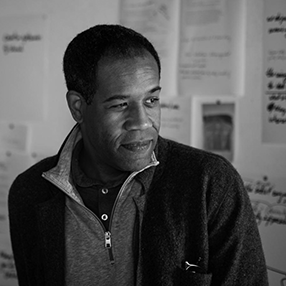Copyright
Paul Green Of course I know the story of the scorpion and the frog. I've known Biggers all my life. I’ve cast down my buckets where I've stood with them, shoulder to shoulder, our bodies bent like double helices in the fields. And when the mob came for Dick didn’t I sit anyways outside his quarters all night like a jailhouse lawyer, him ignorant of the nature of his custody? It was me who kept the townsmen at bay after he provoked them. My cousin among them had watched him grin and wheedle, consort with white people carelessly, our naïve and guileless women, at the civil gathering where he was my ward. And later, because of me, his offense went unanswered, un-atoned. I know the hearts of men are governed by the endowments of nature. Some children are faithful. Some are made to obey. Charles Leavell First I had to capture the boy in a thicket of print. He tried to make my happy darky dangerous, make my darky an idea that I couldn’t bear to swallow. So I made him a hothouse flower, writing, His hunched shoulders and long, sinewy arms that dangle almost to his knees, but warned readers that Nixon, the "Brick Slayer," as I christened him, had none of the charm of speech or manner that is characteristic of so many southern darkies. I am a gentle man. He is very black—almost pure Negro. Withal, I had to cleave that slate with first words, in order to get at him, get the nature right, and I could almost hear the stone sing like the brick he used to beat the white woman who discovered him, that June day in '38, bagging her Philco radio—as if it were me doing the slaying. Richard Wright One quarter argument two quarters confession. I engender my experience in the characters and they thrive; for the balance I tracked Robert Nixon, so-called "Brick Slayer," through rows and columns, finding him breathing in the margins of the Chicago Tribune. I loved that boy like redemption loves a sinner and saw in him the mute pronouncements of the proletariat, mutiny on the Potemkin. No wonder I was reluctant to ditch the script I wrote with Paul Green, that playwright accused of being a lover of the down- trodden. Much as I wished to avoid controversy, when Welles demanded a Bigger without dream sequences, without singing, for the Broadway production, I sighed relief. I knew I had to protect my creation from the caustic ministrations of Southern sensibility. By North Star or candlelight, by necessity, I had to spirit him away. Robert Nixon More crucial than surveillance in the round house of corrections called a panopticon is the being watched the prisoner faces raising hairs on the ears. Like the sun’s warmth on the back recognized as light, recognized as presence. White noise. The confinement of plain sight. The vertiginous spin siphoning off the will to question, to doubt, g-forces pinning back the cheeks, prisoners reduced to images affixed by the weight of the guard's transparent eyeball the unreasoning stump of muscle itself imprisoned like the figures stenciled on an urn.
Credit
Copyright © 2008 by Gregory Pardlo; reprinted by permission of the author. This poem first appeared in Black Renaissance/ Renaissance Noir (7:3, 2007).
Date Published
01/01/2008

